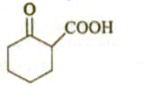Which of the following is not a substrate for decarboxylation?
The correct Answer is:B
Step-by-Step Solution:
1. Understand the Question: The question asks which of the following options is not a substrate for decarboxylation. A substrate is a substance on which an enzyme acts.
2. Define Decarboxylation: Decarboxylation is a chemical reaction that involves the removal of a carboxyl group (-COOH) from a substrate, resulting in the release of carbon dioxide (CO2).
3. Analyze the Options:
- Option 1: Pyruvate: Pyruvate is involved in the Krebs cycle (citric acid cycle). During its conversion, it undergoes decarboxylation where a carboxyl group is removed to form acetyl coenzyme A, releasing CO2. Thus, pyruvate is a substrate for decarboxylation.
- Option 2: Citrate: Citrate is formed from acetyl coenzyme A and oxaloacetate in the Krebs cycle. It does not undergo decarboxylation directly; instead, it is converted to isocitrate without the removal of a carboxyl group. Therefore, citrate is not a substrate for decarboxylation.
- Option 3: Alpha-Ketoglutarate: Alpha-ketoglutarate also undergoes decarboxylation in the Krebs cycle, where it loses a carboxyl group to form succinyl coenzyme A, releasing CO2. Hence, alpha-ketoglutarate is a substrate for decarboxylation.
4. Conclusion: Based on the analysis, the only compound that is not a substrate for decarboxylation is citrate. Therefore, the correct answer is Option 2: Citrate.
---
- Option 1: Pyruvate: Pyruvate is involved in the Krebs cycle (citric acid cycle). During its conversion, it undergoes decarboxylation where a carboxyl group is removed to form acetyl coenzyme A, releasing CO2. Thus, pyruvate is a substrate for decarboxylation.
- Option 2: Citrate: Citrate is formed from acetyl coenzyme A and oxaloacetate in the Krebs cycle. It does not undergo decarboxylation directly; instead, it is converted to isocitrate without the removal of a carboxyl group. Therefore, citrate is not a substrate for decarboxylation.
- Option 3: Alpha-Ketoglutarate: Alpha-ketoglutarate also undergoes decarboxylation in the Krebs cycle, where it loses a carboxyl group to form succinyl coenzyme A, releasing CO2. Hence, alpha-ketoglutarate is a substrate for decarboxylation.
Topper's Solved these Questions
Similar Questions
Knowledge Check
Which of the following compounds cannot undergo decarboxylation on heating?
A B
B C
C D
D
Which of the following compounds will undergo decarboxylation on heating?
A B
B C
C D
D
Which of the following carboxylic acid undergoes decarboxylation easily ?
AC6H5−CO−CH2−COOHBC6H5−CO−COOHCC6H5−C∣OHH−COOHDC6H5−C∣NH2H−COOH
Which of following shows highest rate of decarboxylation in presence of soda lime :
View SolutionIn which one of the following reactions, oxidative decarboxylation does not occur ?
View SolutionWhich of the following carboxylic acid undergoes decarboxylation easily ?
View SolutionWhich of the following carboxylic acid undergoes decarboxylation easily ?
View SolutionWhich of the following reactions does not involve decarboxylation?
View Solution
